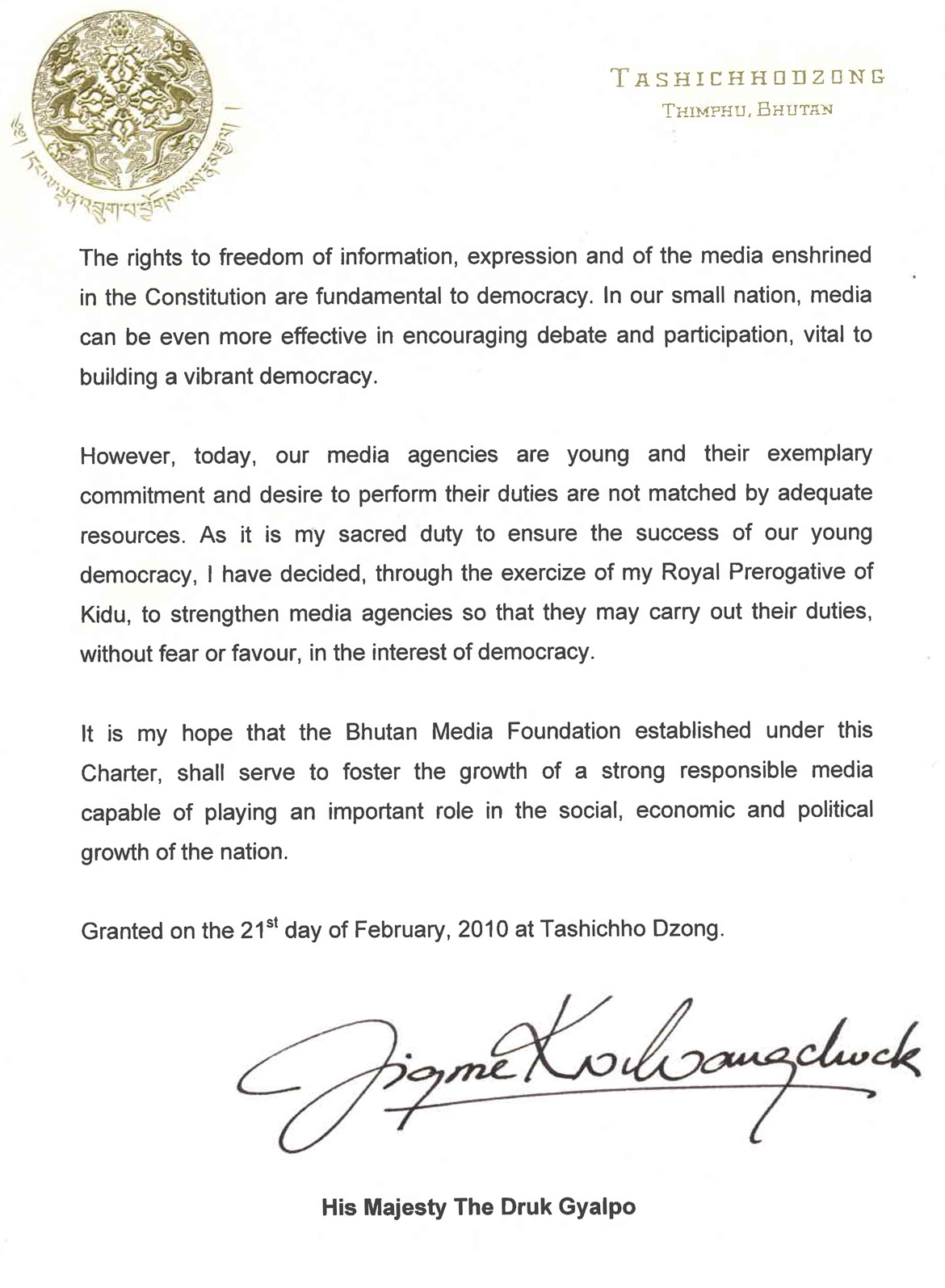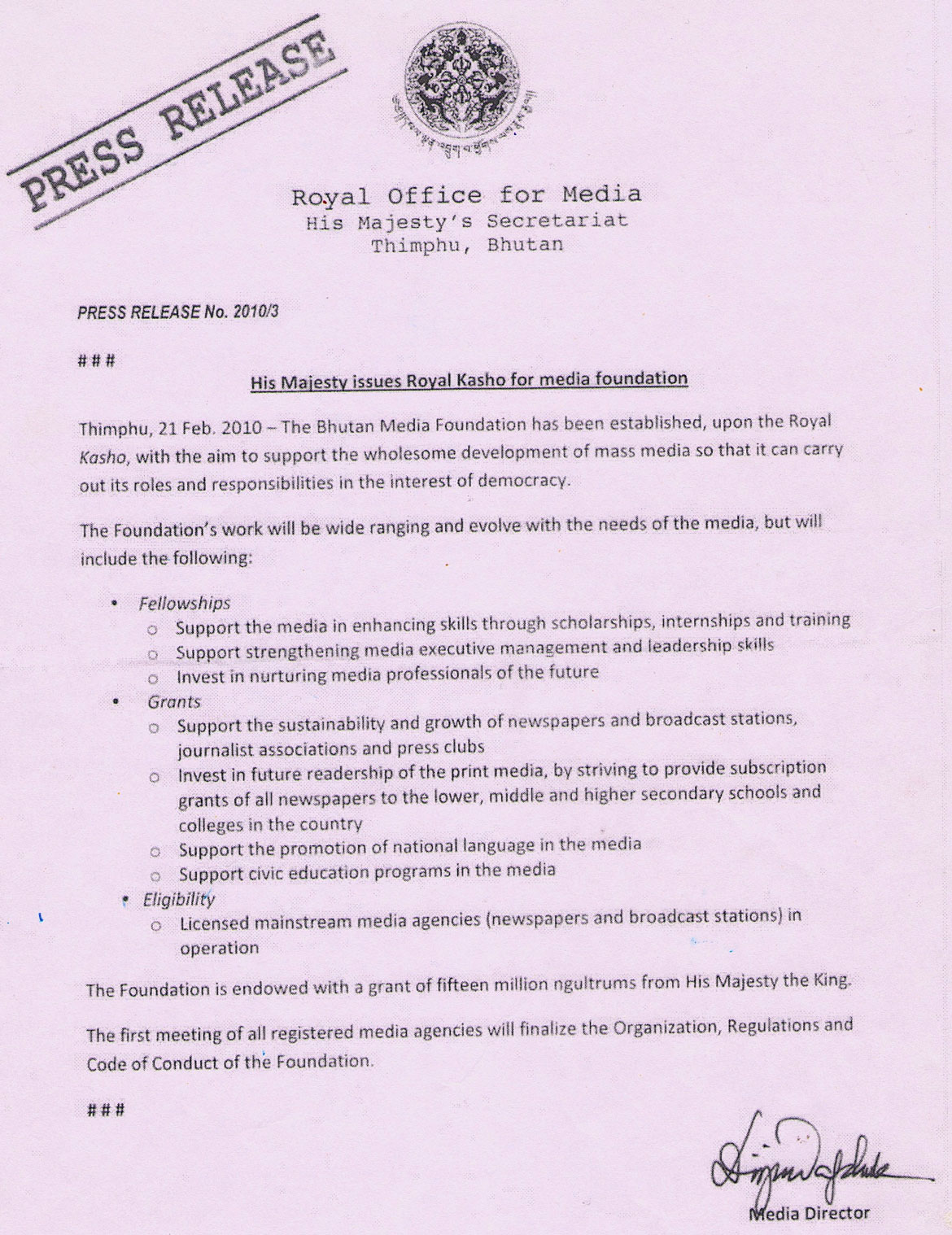Formation of the Bhutan Media Foundation
His Majesty the King on the Media
His Majesty the King during the closing of the 3rd National Assembly session on 30th July 2009 announced his support to the news media in the following words.
“Media – newspapers, television, radio and the internet – must play a very important role. I appreciate that while some of the media agencies are young and lack adequate resources, they have strived to perform their duties with complete commitment. Hereafter, media will be vital in keeping people well informed and in encouraging debate and participation – key to a vibrant democracy. Therefore, I have decided that through the exercise of my Royal prerogative of Kidu, to strengthen media agencies so that they may carry out their duties, without fear or favour, in the interest of democracy.”
First audience on 7 August 2009
His Majesty the King granted an audience to the heads and editors of the print media as well as BBS. The heads and editors submitted the idea of a media foundation to help sustain the media in Bhutan.
Second audience on 14 August 2009
Following the first audience, the managing directors of the print media met and discussed the formation of the Bhutan Media Foundation. A concept note on the Foundation was drafted and agreed upon by all the heads of the print media. The concept note was presented to His Majesty the King during the second audience during which His Majesty assured full support for the Foundation. The group was asked to work on a charter for the Foundation.
First meeting among the media on 15 August 2009
The first meeting finalised the list of the steering committee members to work on the formation of the BMF. A working committee was finalised. The media houses contributed a sum of Nu 10,000 to meet the expenses of the steering committee.
Draft charter submitted to His Majesty the King
The draft charter of the Bhutan Media Foundation was submitted to the Royal Office of Media in August 2009.
His Majesty the King grants Royal Kasho
During an audience granted to the representatives of all the media houses on 21 February 2010, His Majesty issued the Kasho on the establishment of the Bhutan Media Foundation with a seed fund of Nu. 20 million. Subsequently, the first meeting on the formation of the Bhutan Media Foundation was held on 2 March 2010 and was attended by the representatives of the Bhutanese media.
BMF Board formed
The second meeting was held on 8 March 2010 during which the media representatives to the BMF was elected. The working committee wrote a letter to the government requesting government representatives on the BMF Board. The representative of the media to the BMF are Tashi Dorji from BBS, Needrup Zangpo from Bhutan Observer, Tashi Phuntsho from Drukpa magazine and Chencho Tshering from Kuensel. The government proposed the names of Dasho Kinley Dorji, Hon’ble Secretary of MoIC, and Mr. Thinley Dorji, Chief, PPD, the Ministry of Foreign Affairs through a letter dated 7 May 2010.
BMF Director appointed
The first BMF board met on the 24 May 2010 and discussed the appointment of Executive Director for the BMF. It was decided that an advertisement would be placed in all the newspapers and the radio/TV calling for application for the position of Executive Director. The announcement for Executive Director for BMF was placed in the media from 22 June 2010. When the application date closed on 30 August 2010, 15 applicants had applied for the position. However, one applicant withdrew her application. On 14 September 2010, the Board met and shortlisted the candidates to seven with the agreement that the list would be further shortened to about five candidates. On 1 October 2010, final shortlisting was completed in the office of the Secretary, MoIC. Three candidates selected for the interview, namely Kesang Samdrup from the Department of Revenue and Customs, Tenzin R. Wangchuk from the Ministry of Foreign Affairs, and Lily Wangchuk from Simple Solutions. The interview for Executive Director’s post was held on 6 October 2010 at the Office of Bhutan Observer.
BMF starts operation
The Bhutan Media Foundation started operation from 1 March 2011 with the recruitment of Secretariat staff. Since then, the Foundation has changed three Executive Directors. The fourth Executive Director has been in charge of the Foundation since February 2025.
 A young democracy, fragile media and a Foundation
A young democracy, fragile media and a Foundation
For a democracy to succeed, vibrant and independent media is critically important.
As Bhutan prepared for a change in governance, the plurality of media had to find a space. It was 2006. Bhutan Times and Bhutan Observer came. It was just the beginning. Many more would follow.
The early days of media growth was exciting. It was exciting because it fostered healthy competition. There was then the quality of journalism to talk about. It was as if Bhutan changed overnight.
Good days do not last forever. Bhutan’s media development hit the cul-de-sac not long after. Blame must go to regulations and poor vision on the part of regulatory authorities.
Six years after the media boom, media houses were going broke and whining. For media owners, it was money not professionalism. For the professionals, it was a dead end too soon. Seasoned journalists began to leave and that gave a new face to the Bhutanese media. It wasn’t only a rough ride; it was sad.
There was a need for intervention.
His Majesty the King on February 21, 2010 issued a Royal Charter to establish Bhutan Media Foundation, a non-profit entity that shall be exempted from taxes and duties in carrying out its activities and programmes “to foster the growth of a strong, responsible media capable of playing an important role in the social, economic and political growth of the nation.”
The foundation is mandated to support the wholesome development of mass media so that it can carry out its roles and responsibilities in the interest of the democracy. It is expected of the foundation to support the media in enhancing skills through scholarships, internships and training, strengthening media executive management, and leadership skills.
The foundation supports the sustainability and growth of newspapers and broadcast stations, journalists associations and press clubs, and invest in the future readership of the print media by providing subscription grants to the newspapers, schools and colleges in the country.
With the core responsibility to take effective action targeted at informing society by fostering the growth of free, independent, responsive and credible media, the foundation aims to sustain democracy by developing the Bhutanese media through transformational initiatives that promote quality journalism, advance media innovation, engage communities and foster freedom of expression, information and press.

The foundation has spent more than Nu 23 million on training and Nu 2.7 million for content grant
But there are myriad challenges.
The foundation receives small support from international partners to carry out its mandate to create opportunities for short and long-term studies and training within and outside Bhutan, support exchange programmes and links with training institutions, professional associations, research centres, and media organisations within and outside Bhutan, to support in-country journalism and mass communication programmes in colleges and institutes, support participation in seminars, workshops, and conferences on issues related to the media, and to institute in-country scholarships for journalism studies for Bhutanese students from disadvantaged backgrounds.
However, the plans and developmental programmes of the foundation is dependent on donors.
So far, more than a thousand media professionals have been trained. The foundation has spent more than Nu 23 million on training and Nu 2.7 million for content grant.
The foundation’s executive director, Dawa Penjor, said: “ Looking at the media scenario today, we wonder if our initiatives made any difference.”
The state of the media today is that the needs have not changed at all. The development of media has almost stunted. That’s why the foundation continues to provide the same training to the media professionals.
Despite challenges, the foundation sees many opportunities. Mentorship programme that the foundation started two years ago is perhaps the most sustainable initiative yet. At a time when the media houses in Bhutan are losing trained and experienced professionals by droves, training and preparing young entrants have become critically important.
Then there is the thing about the quality of journalism. When professionals do not stay in the job for long, quality of journalism has only to suffer. When media houses cannot pay their employees, the quality of journalism has only to hit rock bottom. This is the situation of media in the country today. The transition is slow. Media contents are often leaving a large number of our people outside of the area of their interest.
These are some of the challenges that the foundation is faced with today. Whatever the challenges, however, the foundation is focused on delivering its mandate because there is a hope.
That’s how Dawa Penjor looks at the foundation’s future and its relationship with media in Bhutan.
Mission
The mission of Bhutan Media Foundation is to take effective action targeted at informed society by fostering the growth of free, independent, responsive and credible media that play a constructive role in the social, economic, and political life of the nation, thereby leading to vibrant democracy.
Vision
The foundation aims to sustain democracy by developing the Bhutanese media through transformational initiatives that promote quality journalism, advance media innovation, engage communities and foster Freedom of Expression, Information and Press.
With support from Helvetas Swiss Intercooperation and Bhutan Centre for Media and Democracy (BCMD)
By Jigme Wangchuk
Source: kuenselonline.com

